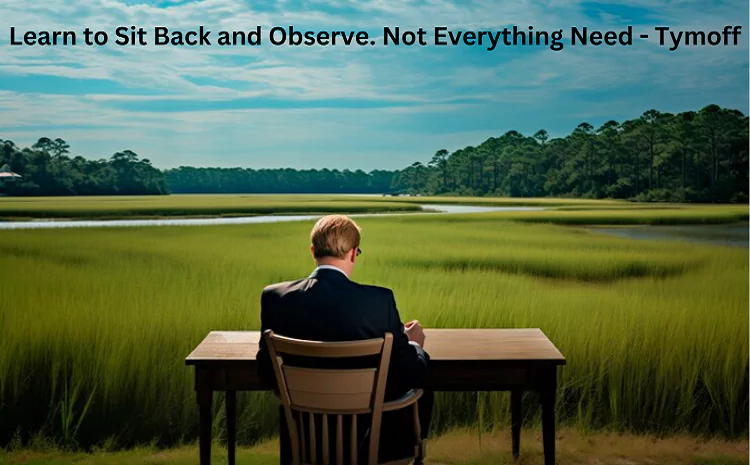In our fast-paced world, we often feel the urge to react to every situation. But learning to sit back and observe can be a powerful tool. This approach allows us to understand more, respond wisely, and avoid unnecessary conflicts. The popular phrase “Learn to sit back and observe, not everything needs your attention” shared by Tymoff emphasizes the importance of being mindful and selective in our reactions.
Key Takeaways
- Observation helps you become more aware of your surroundings.
- Not every situation needs an immediate response or reaction.
- Learning to sit back and observe helps develop patience and emotional intelligence.
- Being selective about where you invest your energy can lead to a more peaceful life.
Power of Observation: Why It Matters
The ability to sit back and observe is an underappreciated skill. It can enhance your understanding of people, situations, and even yourself. When you take a step back and look at things objectively, you gain a clearer perspective.
How Observation Improves Decision-Making?
Observing without immediate judgment can prevent impulsive decisions. By allowing yourself to fully understand a situation, you can make more informed choices.
- Reduces Reactivity: Observation enables a more measured response.
- Encourages Understanding: It helps you see multiple viewpoints.
- Improves Patience: Waiting before reacting builds tolerance.
Benefits of Learning to Sit Back and Observe
| Benefit | Description |
|---|---|
| Enhanced Emotional Control | Reduces impulsive reactions and improves emotional balance. |
| Better Decision-Making | Informed decisions through thorough understanding. |
| Improved Relationships | Leads to more thoughtful responses and understanding. |
| Increased Awareness | Helps notice details that are often overlooked. |
| Reduced Stress | Avoids unnecessary involvement in conflicts or trivial issues. |
Why Not Everything Needs Your Attention?
Many of us feel compelled to respond to everything—be it a minor inconvenience, a social media comment, or a disagreement. But the reality is, not everything needs your attention. Choosing where to focus your energy can make a significant difference in your mental well-being.
Learning to Prioritize
By practicing observation, you can discern what’s truly important. Some things are worth your attention, while others are not. This selective focus allows you to invest your energy in things that genuinely matter.
Signs That You Need to Take a Step Back
- Feeling overwhelmed by minor issues.
- Getting easily irritated by small inconveniences.
- Involvement in unnecessary arguments or debates.
How to Develop the Habit of Observation?
Practice Mindfulness
Mindfulness is about being present in the moment. When you are mindful, you are not just seeing but truly observing. Pay attention to your surroundings and notice small details.
Reflect Before Reacting
When faced with a situation that triggers an emotional response, take a deep breath and pause. Ask yourself if the issue truly needs your immediate reaction.
Take Time for Self-Reflection
Self-reflection helps you understand your reactions and tendencies. It’s a chance to evaluate if you’re responding out of habit or genuine concern.
Limit Social Media Exposure
Social media can overwhelm you with information, making it hard to distinguish between what’s important and what’s not. Limit your exposure and be mindful of what you choose to engage with.
Steps to Develop Observational Skills
| Step | Action |
|---|---|
| Practice Mindfulness | Stay present in the moment and notice small details. |
| Reflect Before Reacting | Take a pause and think before responding. |
| Self-Reflection | Assess your emotions and understand your triggers. |
| Limit Social Media | Reduce exposure to information overload and focus on real-life cues. |
Applying Observation in Daily Life
Personal Relationships
Being observant in relationships helps you understand others better. Instead of reacting to a partner’s words or actions, take a moment to consider their perspective.
Professional Settings
In the workplace, observation can prevent misunderstandings and improve communication. It can also help you read between the lines during meetings or negotiations.
Everyday Situations
Whether you’re at a family gathering or shopping, use observation to gauge the atmosphere and adjust your behavior accordingly. This not only makes you more perceptive but also more adaptable.
Tymoff’s Perspective on Observation and Patience
The phrase “Learn to sit back and observe. Not everything needs your attention” is a gentle reminder that sometimes, the best thing to do is nothing at all. Tymoff suggests that by not rushing to react, you allow situations to unfold naturally. Often, issues resolve on their own without intervention.
Why This Philosophy Matters?
- Encourages Patience: Patience is not just waiting; it’s about how you behave while waiting.
- Promotes Peace: Reducing reactions leads to a calmer and more peaceful mind.
- Builds Inner Strength: It takes strength to hold back and wait for the right time to act.
Conclusion
The ability to learn to sit back and observe is a valuable skill. By choosing when and how to respond, you can avoid unnecessary stress and make wiser decisions. Remember that not everything needs your attention. Sometimes, the best way to manage a situation is to simply let it be.





